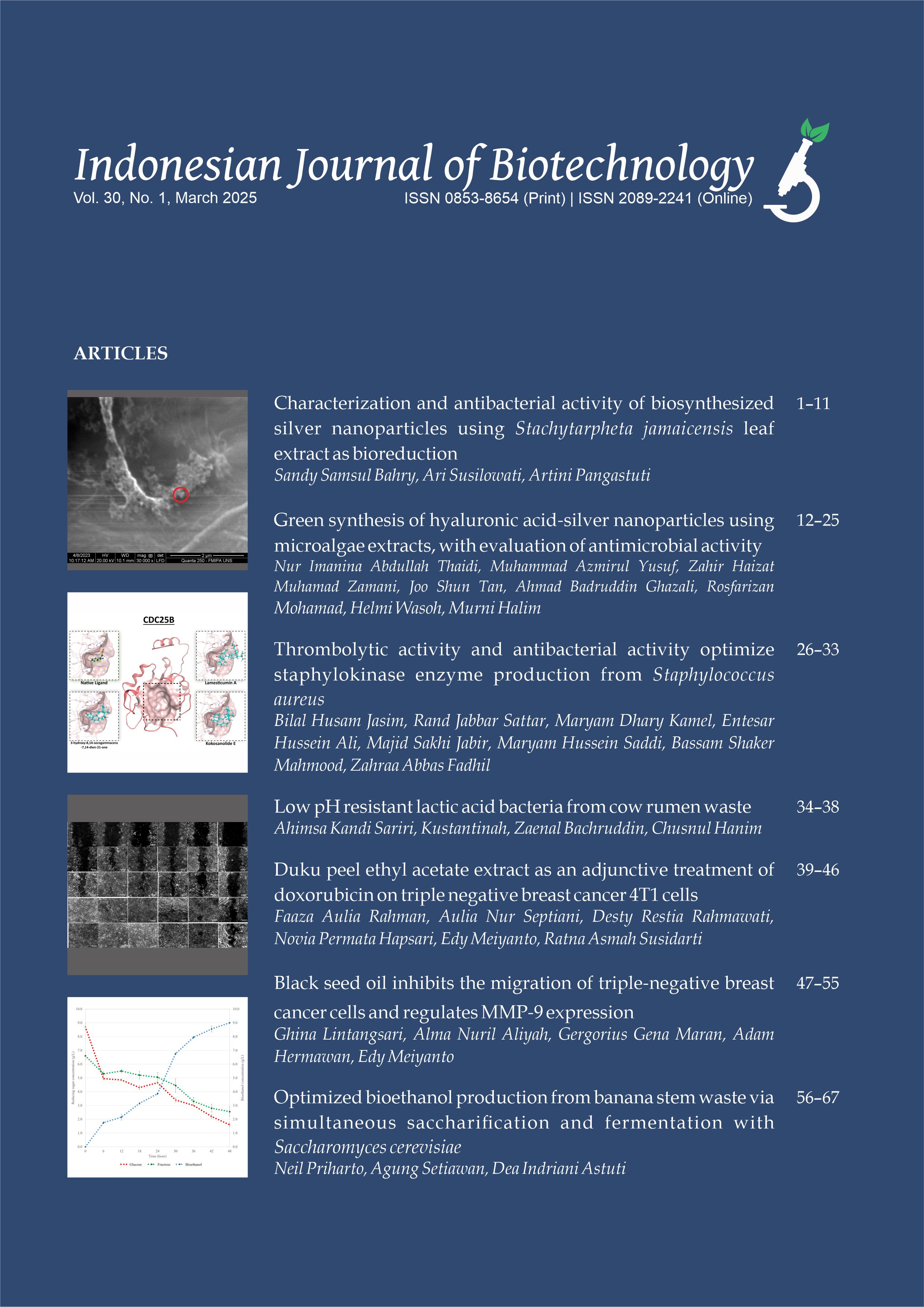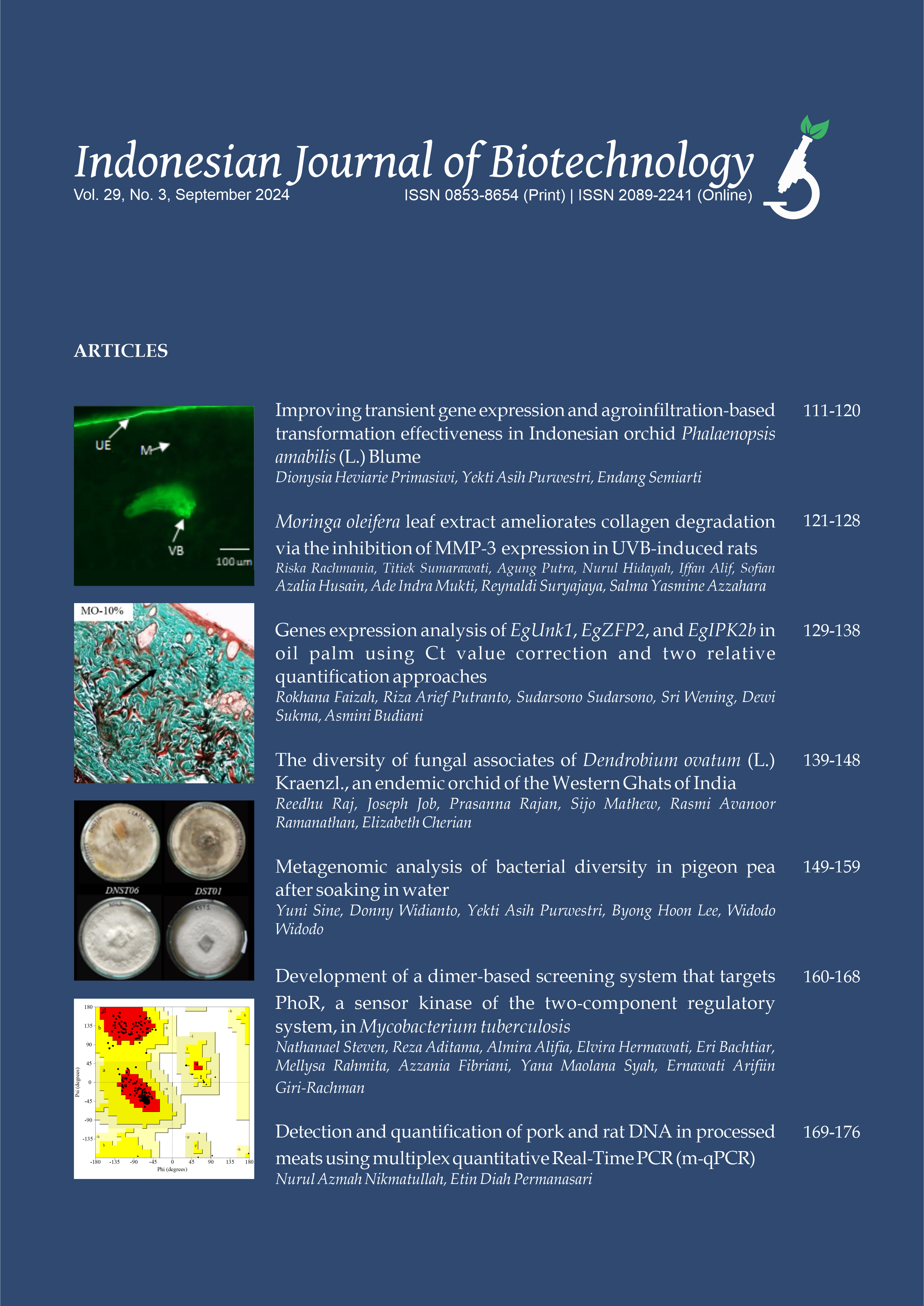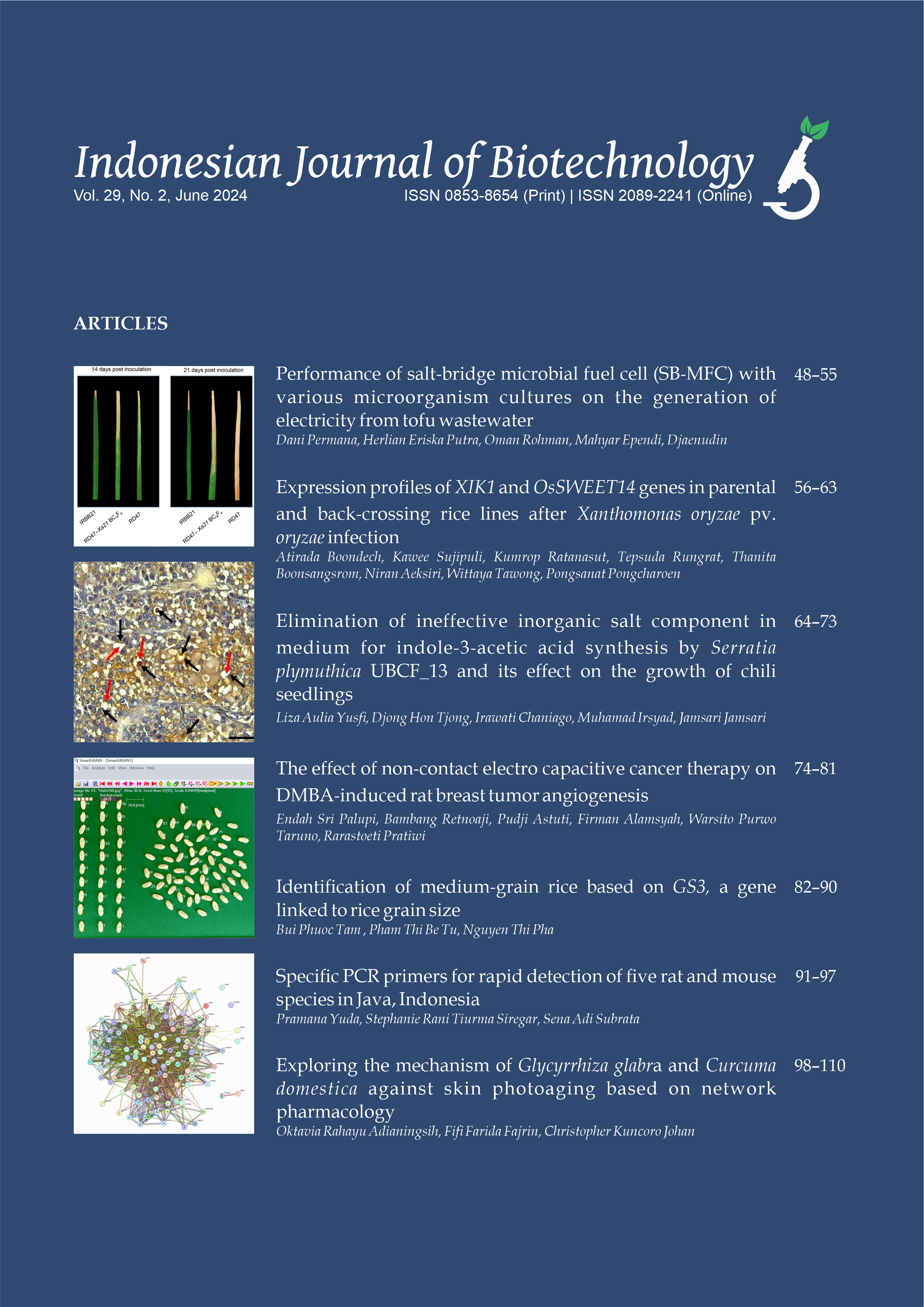Analysis of ethylene biosynthesis gene expression profile during titanium dioxide (TiO2) treatment to develop a new banana postharvest technology
Fenny M Dwivany(1*), Rizkita R Esyanti(2), Veinardi Suendo(3), Aksarani ‘Sa Pratiwi(4), Annisa A Putri(5)
(1) School of Life Science and Technology, Institut Teknologi Bandung, Jl. Ganesha No. 10, Bandung 40132, Indonesia; ForMIND Institute, Bandung, Indonesia; Bali International Research Center for Banana, Universitas Udayana, Bukit Jimbaran, Kuta Selatan, Badung, Bali 80361, Indonesia; Bioscience and Biotechnology Research Center, Institut Teknologi Bandung, Jl. Ganesha No. 10, Bandung 40132, Indonesia
(2) School of Life Science and Technology, Institut Teknologi Bandung, Jl. Ganesha No. 10, Bandung 40132, Indonesia; Bali International Research Center for Banana, Universitas Udayana, Bukit Jimbaran, Kuta Selatan, Badung, Bali 80361, Indonesia
(3) Chemistry Department, Institut Teknologi Bandung, Jl. Ganesha No. 10, Bandung 40132, Indonesia; Research Center for Nanoscience and Nanotechnology, Institut Teknologi Bandung, Jl. Ganesha No. 10, Bandung 40132, Indonesia
(4) School of Life Science and Technology, Institut Teknologi Bandung, Jl. Ganesha No. 10, Bandung 40132, Indonesia
(5) School of Life Science and Technology, Institut Teknologi Bandung, Jl. Ganesha No. 10, Bandung 40132, Indonesia; Bali International Research Center for Banana, Universitas Udayana, Bukit Jimbaran, Kuta Selatan, Badung, Bali 80361, Indonesia; Bioscience and Biotechnology Research Center, Institut Teknologi Bandung, Jl. Ganesha No. 10, Bandung 40132, Indonesia
(*) Corresponding Author
Abstract
banana fruit ripening process is affected by ethylene. Several methods have been developed to extend the shelf life of a banana, such as using ethylene scrubbers. In this study, ttanium dioxide (TiO2), a photocatalyst, was used as an alternatve method to delay the fruit ripening process. The effect of TiO2 on the ripening‐related gene MaACS1 was investgated. Banana fruits were placed in a TiO2‐coated glass chamber and observed for ten days. Fruit ripening in the treated chamber was delayed for eight days compared to the control. Total RNA was extracted from control and TiO2‐treated fruit pulp and synthesized into cDNA. Reverse transcripton PCR was performed to investgate the gene expression, which showed that MaACS1 expression was relatvely lower than treated control. The fnding of these studies suggested that the TiO2 chamber has the potental to extend the shelf life of banana by delaying its ripening process and decreasing the expression of MaACS1. To the best of our knowledge, no previous study has investgated the effect of TiO2 on the expression of genes related to banana fruit ripening.
Keywords
Full Text:
PDFReferences
Cano MP, De Ancos B, Matallana MC, Cámara M, Reglero G, Tabera J. 1997. Differences among Spanish
and LatinAmerican banana cultivars: Morphological, chemical and sensory characteristics. Food Chem
59(3):411–419. doi:10.1016/S03088146(96)002853.
Charoenshap B, Uthaibutra J, Kumpoun W. 2012. Titanium dioxide photocatalytic oxidation on storage
life extension of Mangifera indica cv. Nam dork mai. Agric Sci J 43(3):331–334.
Cordeiro M, Silva MS, OlivieraFilho E, Gayoso de Miranda Z, Aquino F, Fragoso R, Almeida J, Roveinia L, Andrade M. 2008. Optimization of a Method of Total RNA Extraction from Brazilian Native Plants Rich in
Polyphenols and Polysaccharides. In: Simposio Internacional Savanas Tropicais ParlaMundi, Brazil, pages 12–17.
Dadzie BK, Orchard JE. 1997. Routine postharvest screening of banana/plantain hybrids: criteria and
methods, volume 2, page 75. Montpellier: Bioversity International.
Dettmann Bierhals J, Lajolo FM, Cordenunsi BR, Oliveira Do Nascimento JR. 2004. Activity, cloning, and expression of an isoamylasetype starchdebranching enzyme from banana fruit. J Agric F Chem 52(24):7412–7418. doi:10.1021/jf049300g.
Duan X, Joyce DC, Jiang Y. 2007. Postharvest biology and handling of banana fruit. Fresh Produce 1(2):140–152.
Dwivany FM, Hermawaty D, Esyanti RR. 2016. ’Raja Bulu’ banana MaACS1 and MaACO1 gene expression during postharvest storage. In: Acta Horti., 1120, pages 111–114. International Society for Horticultural Science (ISHS), Leuven, Belgium. doi:10.17660/ActaHortic.2016.1120.16.
FAO US. 2019. Top 10 Country Production of Bananas Year 2017. http://www.fao.org/faostat/en/{#}rankings/countries{_}by{_}commodity.
Friend J, Rhodes MJC, editors. 1981. Recent advances in the biochemistry of fruit and vegetables. London:
Academic Press.
Guo H, Ecker J. 2004. The ethylene signaling pathway: new insights. Curr Opin Plant Biol 7(1):40–49. doi:10.1016/j.pbi.2003.11.011.
Handayani RU, Dwivany F. 2014. MaACS2, a stressinducible ACC synthase gene in
Musa acuminata AAA group cultivar pisang ambon. J Math Fund Sci 46(2):194–203. doi:10.5614/j.math.fund.sci.2014.46.2.8.
Hussain M, Bensaid S, Geobaldo F, Saracco G, Russo N. 2010. Photocatalytic degradation of ethylene
emitted by fruits with TiO2 nanoparticles. In: Ind Eng Chem Res., volume 50, pages 2536–2543.
doi:10.1021/ie1005756.
Inaba A, Liu X, Yokotani N, Yamane M, Lu WJ, Nakano R, Kubo Y. 2007. Differential feedback regulation of ethylene biosynthesis in pulp and peel tissues of banana fruit. J Exp Bot 58(5):1047–1057. doi:10.1093/jxb/erl265.
Kanellis A, Tonutti P, Perata P. 2009. Modified and controlled atmospheres for storage, transpiration and
packaging of horticultural commodities, pages 535–567. Boca Raton: CFC Press.
Karmawan LU, Suhandono S, Dwivany FM. 2009. Isolation of MAACS gene family and expression study of MAACS1 gene in Musa acuminata cultivar pisang ambon lumut. HAYATI 16(1):35–39. doi:10.4308/hjb.16.1.35.
Liu X, Shiomi S, Nakatsuka A, Kubo Y, Nakamura R, Inaba A. 1999. Characterization of ethylene biosynthesis associated with ripening in banana fruit. Plant Physiol 121(4):1257–1265. doi:10.1104/pp.121.4.1257.
Lourenço R, Linhares A, de Oliveira A, da Silva M, de Oliveira J, Canela M. 2017. Photodegradation
of ethylene by use of TiO2 solgel on polypropylene and on glass for application in the postharvest of papaya fruit. Environ Sci Pollut Res 24(7):6047–6054. doi:10.1007/s1135601681975.
Lustriane C, Dwivany FM, Suendo V, Reza M. 2018. Effect of chitosan and chitosannanoparticles on post
harvest quality of banana fruits. J Plant Biotechnol 45(1):36–44. doi:10.5010/JPB.2018.45.1.036.
Maneerat C, Hayata Y. 2006. Efficiency of TiO2 photocatalytic reaction on delay of fruit ripening and removal of offflavors from the fruit storage atmosphere. Trans ASABE 49(3):833–837. doi:10.13031/2013.20467.
Matile P, Hörtensteiner S, Thomas H, Kräutler B. 1996. Chlorophyll breakdown in senescent leaves. Plant
Physiol 112(4):1403. doi:10.1104/pp.112.4.1403.
Mosera S, Müller T, Holzinger A, Lütz C, Jockusch S, Turro NJ, Kräutler B. 2009. Fluorescent chlorophyll catabolites in bananas light up blue halos of cell death. Proc Natl Acad Sci USA 106(37):15538–15543. doi:10.1073/pnas.0908060106.
Subagio A, Morita N, Sawada S. 1996. Carotenoids and their fattyacid esters in banana peel. J Nutr Sci Vitaminol 42(6):553–566. doi:10.3177/jnsv.42.553.
Yang SF, Hoffman NE. 1984. Ethylene biosynthesis and its regulation in higher plants. Ann Rev Plant Physiol 35(1):155–189. doi:10.1146/annurev.pp.35.060184.001103.
Zhu Z, Zhang Y, Shang Y, Wen Y. 2019. Electrospun nanofibers containing TiO2 for the photocatalytic degradation of ethylene and delaying postharvest ripening of bananas. Food Bioprocess Technol
12(2):281–287. doi:10.1007/s1194701822071.
Article Metrics
Refbacks
- There are currently no refbacks.
Copyright (c) 2019 The Author(s)

This work is licensed under a Creative Commons Attribution-ShareAlike 4.0 International License.









